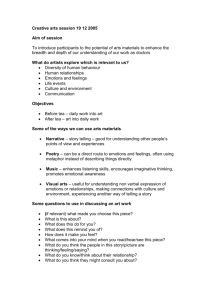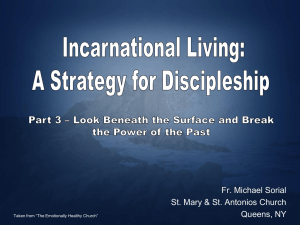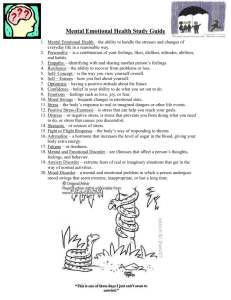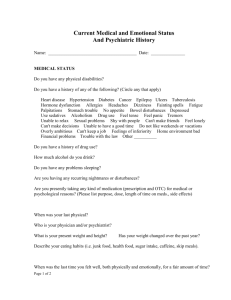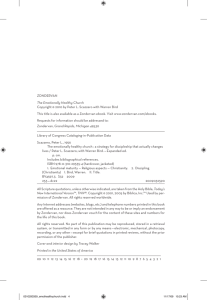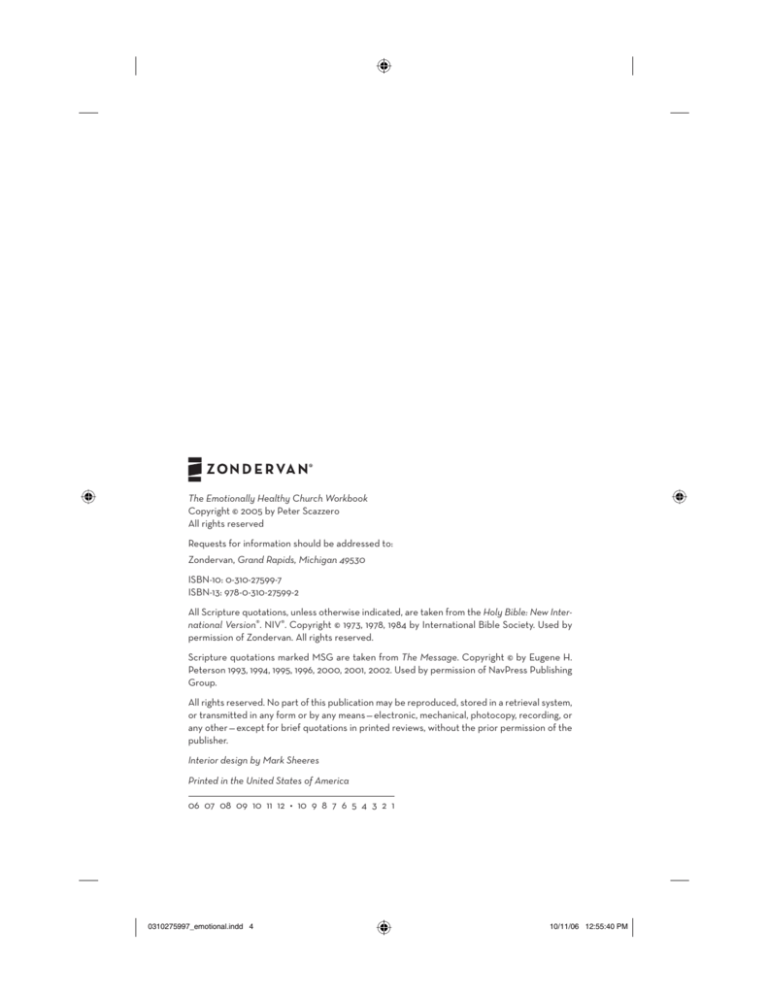
The Emotionally Healthy Church Workbook
Copyright © 2005 by Peter Scazzero
All rights reserved
Requests for information should be addressed to:
Zondervan, Grand Rapids, Michigan 49530
ISBN-10: 0-310-27599-7
ISBN-13: 978-0-310-27599-2
All Scripture quotations, unless otherwise indicated, are taken from the Holy Bible: New International Version®. NIV®. Copyright © 1973, 1978, 1984 by International Bible Society. Used by
permission of Zondervan. All rights reserved.
Scripture quotations marked MSG are taken from The Message. Copyright © by Eugene H.
Peterson 1993, 1994, 1995, 1996, 2000, 2001, 2002. Used by permission of NavPress Publishing
Group.
All rights reserved. No part of this publication may be reproduced, stored in a retrieval system,
or transmitted in any form or by any means — electronic, mechanical, photocopy, recording, or
any other — except for brief quotations in printed reviews, without the prior permission of the
publisher.
Interior design by Mark Sheeres
Printed in the United States of America
06 07 08 09 10 11 12 • 10 9 8 7 6 5 4 3 2 1
0310275997_emotional.indd 4
10/11/06 12:55:40 PM
CONTENTS
Introduction and Overview . . . . . . . . . . . . . . . . . . . . .7
Guidelines for Small Group Leaders/Facilitators. . . . . 11
Study 1:
Discipleship’s Missing Link . . . . . . . . . . . . . . . . . . . .13
Inventory of Emotional/Spiritual Maturity . . . . . . . . .21
Study 2:
Something Is Desperately Wrong . . . . . . . . . . . . . . . .35
Study 3:
Principle 1: Look Beneath the Surface . . . . . . . . . . . .41
Study 4:
Principle 2: Break the Power of the Past . . . . . . . . . . .47
Study 5:
Principle 3: Live in Brokenness and Vulnerability . . . .53
Study 6:
Principle 4: Receive the Gift of Limits . . . . . . . . . . . .63
Study 7:
Principle 5: Embrace Grieving and Loss . . . . . . . . . . .71
Study 8:
Principle 6: Make Incarnation Your Model for
Loving Well . . . . . . . . . . . . . . . . . . . . . . . . . . . . .79
Conclusion: Where Do You Go from Here? . . . . . . . .87
0310275997_emotional.indd 5
10/11/06 12:55:40 PM
S T U D Y 1:
Discipleship’s Missing Link
Reading: Introduction and Chapter 1
GROW I NG C ON N EC T E D
Taking an “Emotional Snapshot”
1) Divide an 8½" x 11" piece of paper into four boxes, and write the
following words at the top of each box.
Glad
Sad
Mad
Anxious/
Afraid
In each box, draw a picture or write down in words the thing(s)
you are Glad, Mad, Sad, or Anxious/Afraid about in your life
right now. Give yourself five minutes.
2) In groups of four or as a whole group, have people share their
pictures and/or words with each other. (Have each person pick
one category to share if time is limited.)
13
0310275997_emotional.indd 13
10/11/06 12:55:41 PM
The Emotionally Healthy Church
14
WORK BOOK
STA RT E R S
The summary of The Emotionally Healthy Church is this:
Emotional health and spiritual maturity are inseparable.
It is not possible to be spiritually mature while
remaining emotionally immature.
3) How does being aware of your “Emotional Snapshot” relate to
your discipleship in Christ?
B I B L E S T U DY
4) Read Psalm 69:1 – 12, 19 – 21, and 29 – 31. Seek to step into
David’s shoes. What emotions was he feeling as he wrote this
psalm? Circle any that you find in the list below, or add your
own beneath the box.
Joy
Love
Gladness
Thanksgiving
Certainty
Peace
Trust
Playfulness
Accepted
0310275997_emotional.indd 14
Depression
Grief
Hopelessness
Despair
Pain
Helplessness
Confusion
Rejection
Anger
Bitterness
10/11/06 12:55:42 PM
S TUDY 1:
Discipleship’s Missing Link
15
David: Unafraid to Bare His Soul
The Bible presents David as a man after God’s own heart, yet a
quick reading of the Psalms shows us that his emotional world
was very human and very broken. David bares his soul in these
heart-wrenching poems, and by placing them in his Scriptures,
God seems to be saying: “To have true intimacy with me is not
to paint a ‘Praise the Lord’ smile on your face 24/7, but to be
so trusting in my love and embrace that you are free and safe
to share all your feelings with me — no matter how messy or
confusing they might seem to you.”
5) If David visited your church or small group and presented
Psalm 69 as his testimony, would you take it as a sign of
spiritual weakness or spiritual strength, immaturity or maturity?
Explain.
6) How would you react if David opened up in this way in your
small group? How would you feel if David were your pastor,
sharing this with your congregation at a Sunday worship
service?
0310275997_emotional.indd 15
10/11/06 12:55:42 PM
16
The Emotionally Healthy Church
WORK BOOK
7) What about your life experiences, family history, or bad religious
teachings may have caused you to deny or repress your feelings
rather than bringing them to God as David did?
Jesus: A Savior with Emotions
When you look at the Scriptures with this new paradigm in
hand, you will see that Jesus was anything but an “emotionally
frozen Messiah.” He expressed emotion with unashamed,
unembarrassed freedom.
Consider the broad range of emotions Jesus experienced.
●
He shed tears. (Luke 19:41)
●
He was filled with joy. (Luke 10:21)
●
He grieved and felt sorrow. (Mark 14:34; Luke 7:13)
●
He was angry. (Mark 3:5)
●
He showed astonishment and wonder.
(Mark 6:6; Luke 7:9)
●
He felt distress. (Mark 3:5; Luke 12:50)
0310275997_emotional.indd 16
10/11/06 12:55:42 PM
S TUDY 1:
Discipleship’s Missing Link
17
A PPL IC AT IONS/ E X E RCISE S
The diagram below illustrates the different aspects of what it means
to be made in God’s image. Conformity to Christ includes all these
areas.
Emotional
Social
Physical
Intellectual
Spiritual
“In the minds of many today, the repression of feelings and emotions
has been elevated to the status of Spirit or virtue. Denying anger,
ignoring pain, skipping over depression, running from loneliness,
avoiding confusing doubts, and turning off our sexuality has
become a way of spiritual life.” (EHC, pp. 52 – 53)
8) What would your life be like if a slice of the above pie were
missing? How would it prevent you from living a truly Christlike life?
0310275997_emotional.indd 17
10/11/06 12:55:42 PM
The Emotionally Healthy Church
18
WORK BOOK
9) In your daily spiritual life, do you treat your emotions as a gift
from God and as a discipleship issue? Or do you tend to see them
as “dead weight,” a distraction, maybe even a curse? Explain.
10) Complete the following sentence stem: I am beginning to
realize . . .
WR A PPI NG UP
We saw how people in the Bible, such as David and even Jesus himself,
enjoyed full and vibrant emotional lives. Out of their security in
God’s love and grace, they were able to freely express their feelings to
themselves, to others, and to their heavenly Father.
Embracing our emotions can be a very difficult and confusing thing
to do. Short-term spiritual “victories” seem to come easier, cleaner, and
prettier when we bury and stuff our feelings. Learning how to hear
what God is doing and saying to us through our emotions can appear
to be a waste of time.
Join the apostle Paul in praying that Christ be formed in every part
of you — including your emotional life (Gal. 4:19), so that you can
fully reflect the image of God.
G OI NG DE E PE R
ß
This week, go back to the list of emotions that Jesus experienced,
and focus on a few that don’t fit so well with your ideas of what
0310275997_emotional.indd 18
10/11/06 12:55:42 PM
S TUDY 1:
Discipleship’s Missing Link
19
Jesus is like. Consider how you handle those emotions when
they come up in your life. Allow God to let the reality of Jesus’
vibrant emotional life sink in. Ask God to grant you the grace
to embrace the fullness of your humanity and to share in the
freedom of Jesus to experience your emotions and feelings.
■
Start keeping a “Feelings Journal.” For now, use the four feelings
of the “Emotional Snapshot” exercise as a start. Take a daily
look at what you’re glad, mad, sad, and anxious/fearful about.
Offer your emotional world to the Lord Jesus, asking him how
he is coming to you or speaking to you through them.
FOR NE X T T I M E
■
Read chapters 2 – 4.
■
Complete the “Inventory of Emotional/Spiritual Maturity”
beginning on page 21.
■
Remember, it’s completely normal and expected to score higher
in certain Principles than others. God often grows us in seasons,
dealing with one issue at a time in our lives. The better response
to these “gaps” is acknowledging that they exist and exploring
what we can do to grow through them.
■
After completing the inventory, you may want to go through it
a second time with someone you trust (your spouse or a close
friend) and ask for their feedback on your responses.
0310275997_emotional.indd 19
10/11/06 12:55:43 PM

